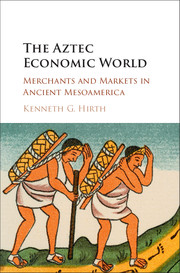Book contents
- Frontmatter
- Contents
- List of figures
- List of tables
- Preface
- Abbreviations
- 1 Introduction to the Aztec economic world
- 2 The structure of Mesoamerican economy
- 3 The Mesoamerican marketplace
- 4 Merchants, profit, and the precolumbian world
- 5 Often invisible: domestic entrepreneurs in Mesoamerican commerce
- 6 The professional retail merchants
- 7 Merchant communities and pochteca vanguard merchants
- 8 The tools of the trade and the mechanics of commerce
- 9 Conclusions
- Notes
- Glossary of Nahuatl and early colonial Spanish terms
- Bibliography
- Index
8 - The tools of the trade and the mechanics of commerce
Published online by Cambridge University Press: 05 May 2016
- Frontmatter
- Contents
- List of figures
- List of tables
- Preface
- Abbreviations
- 1 Introduction to the Aztec economic world
- 2 The structure of Mesoamerican economy
- 3 The Mesoamerican marketplace
- 4 Merchants, profit, and the precolumbian world
- 5 Often invisible: domestic entrepreneurs in Mesoamerican commerce
- 6 The professional retail merchants
- 7 Merchant communities and pochteca vanguard merchants
- 8 The tools of the trade and the mechanics of commerce
- 9 Conclusions
- Notes
- Glossary of Nahuatl and early colonial Spanish terms
- Bibliography
- Index
Summary
Every economic system has a set of beliefs and operating principles that guide economic interaction. Without them economic interaction would not be possible. Notions about gifting, reciprocity, value, and maximization all impact how individuals interact with one another. Maxims such as “do onto others as you would have others do onto you” and “let the buyer beware” establish very different criteria for how individuals operate in economic relationships.
The larger and more internally specialized an economic system becomes, the more tools and economic instruments are created to facilitate interaction or to overcome the obstacles that impede it. These instruments include formal and informal currencies, credit and credit cards, loans and interest, and a range of formal contracts and the contract law that attend them. The type and volume of goods circulating in commercial settings are a function of these operating principles and economic instruments. As economic systems grow in size, new forms of economic organization appear and operate alongside preexisting forms without replacing them. Economic systems are by nature plastic and polymorphic, and become increasingly so as they grow in size.
This chapter examines the basic economic instruments and principles of operation found in highland Nahua economies. In common parlance these are the tools of the trade and the rules of the road. The best information on these subjects comes from Sahagún's Tlatelolco merchant informants which is fortunate because they were the individuals who evaluated what constituted acceptable economic behavior both in and outside the marketplace. The discussion begins with the general principles operating at all levels of Nahua society and then examines the evidence for specific economic features such as the use of agents, consignment selling, brokers, factors, and interest bearing loans. While the Aztec world lacked many of the tools of modern capitalism, the entrepreneurial spirit was clearly present and supplied the engine behind commercial interaction.
The Nahua moral economy
The moral economy refers to the fundamental beliefs on which economic interaction is based. It consists of the shared interests and norms of behavior which underlie all economic interactions (Gudeman 2001). They are based on the moral values taught to children during their upbringing and reinforced through social interaction within the community where they reside.
- Type
- Chapter
- Information
- The Aztec Economic WorldMerchants and Markets in Ancient Mesoamerica, pp. 237 - 269Publisher: Cambridge University PressPrint publication year: 2016



